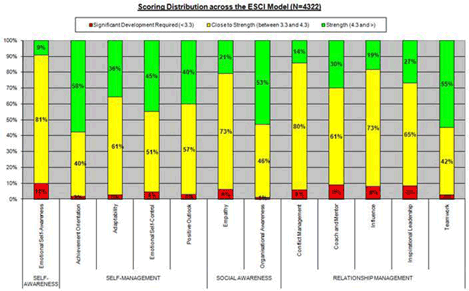We need to do a better job of evaluating the emotional competency or our leaders. “A fine balance has to be maintained between technical and emotional competency of the individual and organization objectives and culture, wrote Sonia Jaspal back in 11/16/2011. Here is an excerpt from her argument, which deserves wider circulation.
A 2010 survey of HayGroup- Emotional Intelligence at the heart of performance – identified the crux of the problem. It showed that out of 12 competencies for measuring emotional intelligence –20% of the respondents had no strengths, 52% had 3 or fewer and just 16% had 9 or more. This means, that just 16% of the respondents are emotionally capable of being good leaders.

ESCI scores further analysis indicated that – the competencies typically seen as strength include achievement orientation, teamwork and organizational awareness. Whereas, those that typically require most development include emotional self-awareness, conflict management, influence and inspirational leadership. Think of it, without the emotional intelligence to understand one’s own and other people’s behavior, – can an individual positively influence others, lead teams and inspire people?
This means two things. First, that society doesn’t have a high percentage of emotionally intelligent people. Second, people without the emotional intelligence get leadership positions on technical and execution skills. Beyond a point, this results in failed leadership and causes damage to the organization. Leaders with low emotional self-awareness de-motivate 60% of the staff. The staff is disengaged, suffers in a toxic work environment and organization faces retention problems.
Read the full post, Risky Selection of Leaders, at Sonia Jaspal’s RiskBoard.
To contact James McRitchie directly, please email jm@corpgov.net

















